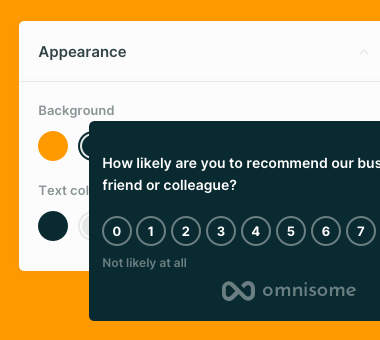Friday, February 3, 2023
What is Net Promoter Score ® (NPS)
Net Promoter Score ® (NPS) measures customer loyalty and satisfaction. It is one of the most popular customer experience metrics for businesses and product managers today. NPS tells you how likely a customer is to recommend your product or service to someone else.
In this article, we'll take an in-depth look at Net Promoter Score:
- NPS definition
- NPS survey questions
- Learn the formula and how to calculate NPS
- Understand what is a good NPS
- Discuss how to improve NPS
- Look into the benefits of NPS
- Discover ways to extend NPS
What is a Net Promoter Score?
The Net Promoter Score (NPS) is a customer satisfaction metric for measuring loyalty and satisfaction. It provides a single metric that can be used to benchmark your business success and potential.
NPS is based on a single-question survey which makes it easy to use and understand. An affordable way to measure success makes it popular among businesses. Today, NPS is used by almost 70% of all Fortune 1000 companies.

The term NPS was first introduced in the article of Harvard Business Review back in 2003 by Fred Reichheld. As it got momentum, it raised in popularity to become one of the most popular and discussed business metrics.
The Net Promoter Score (NPS) is a registered trademark of Fred Reichheld in conjunction with Bain & Company and Satmetrix.
How to calculate NPS?
Net Promoter Score survey consists of a single question - “How likely are you to recommend our business to a friend or colleague?”.
Customers can respond to that question on a scale of 0 to 10, with 0 being "Not likely at all" and 10 being "Extremely likely".
The NPS score is calculated by subtracting the percentage of customers who are "detractors" (those who respond with a 0-6) from the percentage of customers who are "promoters" (those who respond with a 9-10).

What happens to votes ranging from 7 to 8? Those are considered to be passive customers and being ignored.
The final formula of NPS is:
NPS = % promoters - % detractors
At the same time, a proper NPS survey software will do the math for you.
To illustrate it better, let's look at an example of calculating NPS.
We have a functional company that conducted an NPS survey among their customers. In total, we will have 100 customers responded to the NPS survey. In the results, 20 of them gave a score of 9 or 10, 10 customers gave the score no higher than 6. This means that we have 20% of all customers being “promoters” and 10% being “detractors”.
Using a formula above, we can calculate NPS score ( 20% - 10%). The NPS score for this company will be 10.
What is a good Net Promoter Score
Net Promoter Score can vary between -100 and 100, where -100 is extremely bad and 100 being excellent.
In real life, it is doubtful to ever see scores -100 or 100. The truth is somewhere in the middle and such scores should be you cautious if the data or calculation is correct.
NPS experts suggest that any score above 0 is good, above 20 is great, and above 50 is excellent.
What if your NPS is below zero? You are not doomed. It seems that your business has flaws you should address and turn the ship around.
One of the ways to understand if your NPS is good enough is by looking on an industry average. Nevertheless, be aware that these numbers may be inaccurate since companies avoid publishing information about negative NPS. No business wants to send negative signal to their existing and potential customers or investors.
Should you focus on higher NPS? Of course, but only if you monitor data honestly. It is worthless to ask for NPS only to customers who left your business a great review. This will result in corrupted results and wrong business decisions based on those data.
If you decide to go with an NPS survey, reach out to all of you customers. It is more important to get real data rather than have high NPS on paper.
Another important thing you should know about Net Promoter Score is how it will change over time. With that mind, NPS is not a one-time survey to run and forget.
As a startup, you tend to have higher NPS since you invite early adopters and tailor your business based on their needs. Those people are willing to give you higher NPS since you are working with them closely.
For the startup business and business hypothesis, a good NPS benchmark would be 50 or higher. Over time, as your business mature, your NPS may decline which is normal behavior in the product life cycle.
Are you ready to build better products?
How to improve your NPS?
NPS is an indicator of your customer loyalty not an instrument. Your business activities define your NPS and not the other way around.
Of course, you can use high NPS as a marketing instrument to spread the word around or please potential investors, but you have to do your homework to get there.
To improve your Net Promoter Score, your business should focus on two main parts:
- Product/Services provided
- Customer experience
A high-quality product that is easy-to-use and is fairly priced will make you customers more likely to talk about it. For the software industry and e-commerce, it is also important to avoid bugs that stops your customers from achieving their goals.
An additional bonus (extra) provided by your product is also very likely to impact your NPS in a positive way. As Google co-founder, Larry Page, once said - “Always deliver more than expected.”
To summarize the product side, make sure to deliver what you promised, address issues on time, take care of performance, and provide extra functionality to please your customers.
On the customer experience side, the way you communicate and provide customer support is crucial.
Building a positive relationship with your customers has a direct impact on NPS. In many cases it can help you to overcome issues if your product is underperforming.
We are all just humans and we may accept mistakes of the businesses and products. What is important is the way how businesses communicate those issues. Listen to your customers, be honest with them and have a culture in place that is customer-centric.
Make sure to communicate with all of your customers. Don't focus on promoters solely.
Of course you should make sure that they stay your promoters in the future. Still, you can (and should) work on converting passives and detractors into promoters. Sometimes, it take little effort to resolve an issue of a customer to convert him from detractor to promoter.
Also, customer experience does not end with the way you communicate. It is equally important to acknowledge when to ask for NPS. While it may not directly improve the results, it will help you to get honest data and avoid lower scores.
Do not disturb your customers or block their work. A blocker in the middle of the process will surely have a negative impact on your NPS.
Think of the right time and place. If you are a global business, make sure to fit the time zone of your customers. It is highly doubtful that your customers will give you high NPS if you wake them up during the night.
Last but not least, take care of your Employee Net Promoter Score (eNPS) which is your business internal NPS. Remember that healthy organizational culture has a huge impact on your business output. Happy employees are more willing to take an extra step to please your customers.
How business benefits from knowing NPS
Knowing your NPS contributes internally and externally.
It is a single metrics for your business to understand how loyal your customers are. Plus, it can give you a way to measure your success against competitors or industry average.
Net Promoter Score serves as an indicator for your recent business, product, or service decisions. It can help you to understand the impact of your recent changes or a new feature you delivered (or plan to deliver).
In fact, NPS contributes to key business metrics:
- Revenue
- Costs
- Risk management
- Customer lifetime value
- Churn rate
- Time-to-market
Many companies use NPS even before the actual product is shipped to test hypothesis and find if their product has a market fit. Such an approach helps businesses save thousands of dollars and hours of development.
On the internal side, NPS can be used as an instrument to build a customer-centric companies where everyone is committed to the common goals.
High NPS can help you to keep the morale of your team high and focus on your North Star.
With NPS on your hands, you will understand where do you stand and more importantly where do you want to go next.
How to extend NPS?
It is important to acknowledge that Net Promoter Score is just one metrics that you should measure. It is just a part of your feedback loop and can not answer all of your questions.
One of the most important questions that NPS will not help you with is “Why”, “What” and “How”. The exact questions you should ask next when receiving your Net Promoter Score.
Why do promoters think that your product or service is great? Why do detractors gave you such a low score. How to convert passives into promoters? What part of the product is underperforming?

Answering those questions will help you to define what exactly you should do next. Should you focus on improving your customer support or maybe there is an essential feature missing that you need to implement.
With those and more questions in mind, NPS becomes a part of a larger customer satisfaction and experience journey where question about Net Promoter Score becomes a starting point to getting an additional feedback.
In the terms of survey, NPS question should be considered as a way to segment your customers into different batches. You then approach these batches with different goals in mind:
- Understand why promoters love your product and the value it brings
- Discover ways to convert passives into promoters
- Define and remove the blockers that stops detractors from achieving their desired goals
With such information on your hands, you are ready to do detailed research, build a plan, and take action.
Conclusions
Net Promoter Score (NPS) is an extremely important and essential metric for any business that wants to succeed. It is an easy way to measure your company health and growth in conjuction with other important characteristics.
The sooner you will start to follow your NPS the better decisions you will be able to make in the future.
At the same time, NPS can not be considered as an instrument but an indicator of your past actions. As you combine NPS with other ways of collecting feedback, you will have a clear picture on where to get next to build better products/services.
Explore more
It’s time to start understanding your customers
Stop playing guesstimates. With Omnisome, you are building a lean feedback loop with your customers joining the game.
